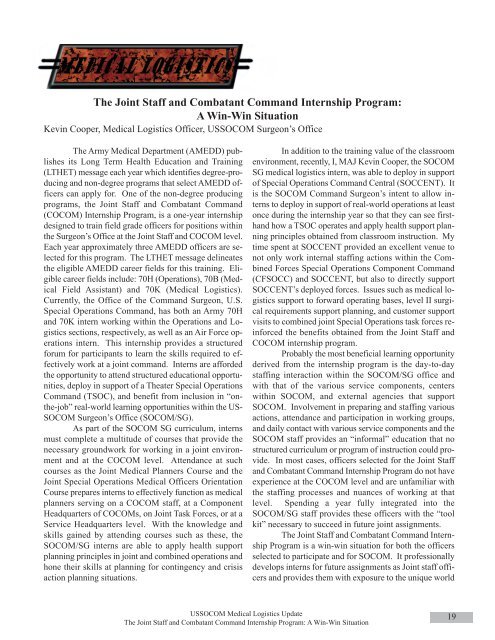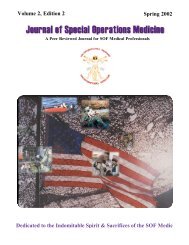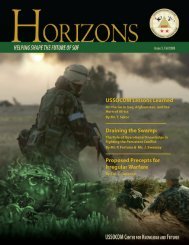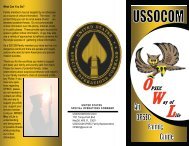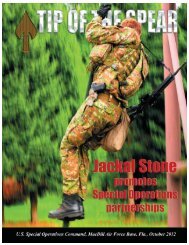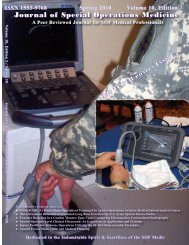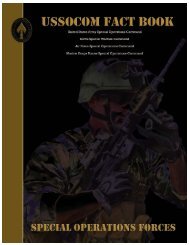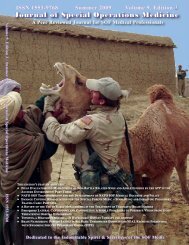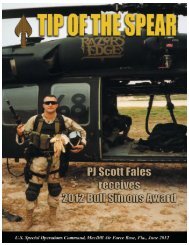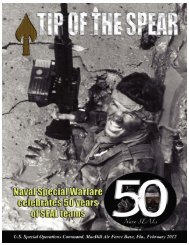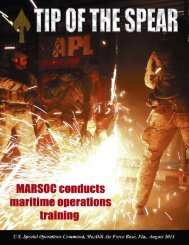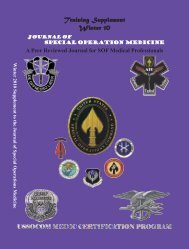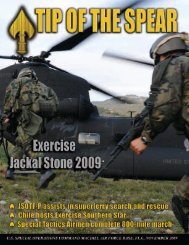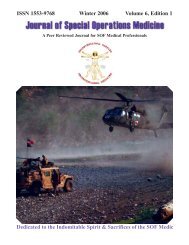Spring 07 front cover - United States Special Operations Command
Spring 07 front cover - United States Special Operations Command
Spring 07 front cover - United States Special Operations Command
- No tags were found...
You also want an ePaper? Increase the reach of your titles
YUMPU automatically turns print PDFs into web optimized ePapers that Google loves.
The Joint Staff and Combatant <strong>Command</strong> Internship Program:A Win-Win SituationKevin Cooper, Medical Logistics Officer, USSOCOM Surgeon’s OfficeThe Army Medical Department (AMEDD) publishesits Long Term Health Education and Training(LTHET) message each year which identifies degree-producingand non-degree programs that select AMEDD officerscan apply for. One of the non-degree producingprograms, the Joint Staff and Combatant <strong>Command</strong>(COCOM) Internship Program, is a one-year internshipdesigned to train field grade officers for positions withinthe Surgeon’s Office at the Joint Staff and COCOM level.Each year approximately three AMEDD officers are selectedfor this program. The LTHET message delineatesthe eligible AMEDD career fields for this training. Eligiblecareer fields include: 70H (<strong>Operations</strong>), 70B (MedicalField Assistant) and 70K (Medical Logistics).Currently, the Office of the <strong>Command</strong> Surgeon, U.S.<strong>Special</strong> <strong>Operations</strong> <strong>Command</strong>, has both an Army 70Hand 70K intern working within the <strong>Operations</strong> and Logisticssections, respectively, as well as an Air Force operationsintern. This internship provides a structuredforum for participants to learn the skills required to effectivelywork at a joint command. Interns are affordedthe opportunity to attend structured educational opportunities,deploy in support of a Theater <strong>Special</strong> <strong>Operations</strong><strong>Command</strong> (TSOC), and benefit from inclusion in “onthe-job”real-world learning opportunities within the US-SOCOM Surgeon’s Office (SOCOM/SG).As part of the SOCOM SG curriculum, internsmust complete a multitude of courses that provide thenecessary groundwork for working in a joint environmentand at the COCOM level. Attendance at suchcourses as the Joint Medical Planners Course and theJoint <strong>Special</strong> <strong>Operations</strong> Medical Officers OrientationCourse prepares interns to effectively function as medicalplanners serving on a COCOM staff, at a ComponentHeadquarters of COCOMs, on Joint Task Forces, or at aService Headquarters level. With the knowledge andskills gained by attending courses such as these, theSOCOM/SG interns are able to apply health supportplanning principles in joint and combined operations andhone their skills at planning for contingency and crisisaction planning situations.In addition to the training value of the classroomenvironment, recently, I, MAJ Kevin Cooper, the SOCOMSG medical logistics intern, was able to deploy in supportof <strong>Special</strong> <strong>Operations</strong> <strong>Command</strong> Central (SOCCENT). Itis the SOCOM <strong>Command</strong> Surgeon’s intent to allow internsto deploy in support of real-world operations at leastonce during the internship year so that they can see firsthandhow a TSOC operates and apply health support planningprinciples obtained from classroom instruction. Mytime spent at SOCCENT provided an excellent venue tonot only work internal staffing actions within the CombinedForces <strong>Special</strong> <strong>Operations</strong> Component <strong>Command</strong>(CFSOCC) and SOCCENT, but also to directly supportSOCCENT’s deployed forces. Issues such as medical logisticssupport to forward operating bases, level II surgicalrequirements support planning, and customer supportvisits to combined joint <strong>Special</strong> <strong>Operations</strong> task forces reinforcedthe benefits obtained from the Joint Staff andCOCOM internship program.Probably the most beneficial learning opportunityderived from the internship program is the day-to-daystaffing interaction within the SOCOM/SG office andwith that of the various service components, centerswithin SOCOM, and external agencies that supportSOCOM. Involvement in preparing and staffing variousactions, attendance and participation in working groups,and daily contact with various service components and theSOCOM staff provides an “informal” education that nostructured curriculum or program of instruction could provide.In most cases, officers selected for the Joint Staffand Combatant <strong>Command</strong> Internship Program do not haveexperience at the COCOM level and are unfamiliar withthe staffing processes and nuances of working at thatlevel. Spending a year fully integrated into theSOCOM/SG staff provides these officers with the “toolkit” necessary to succeed in future joint assignments.The Joint Staff and Combatant <strong>Command</strong> InternshipProgram is a win-win situation for both the officersselected to participate and for SOCOM. It professionallydevelops interns for future assignments as Joint staff officersand provides them with exposure to the unique worldUSSOCOM Medical Logistics UpdateThe Joint Staff and Combatant <strong>Command</strong> Internship Program: A Win-Win Situation19


